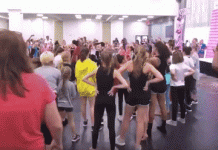 Young students can be the most motivated and energetic classes you teach, but they may also loose interest easily. Carefully structuring classes for younger students to combat short attention spans is a must!
Young students can be the most motivated and energetic classes you teach, but they may also loose interest easily. Carefully structuring classes for younger students to combat short attention spans is a must!
Keep Moving
Sometimes young students get bored of one topic if you focus on it for too long. Because of this, it is best to create lessons that are structured and focused but also dynamic. Try turning practicing dance moves into a game or set aside time for the students to choose what they work on. This gives them something to look forward to and engages their competitive nature.
Layer
While younger students may seem to understand instruction at first, they may need to repeat a dance move multiple times before they can securely add it to their inventory of skills. Because of this, finding ways to incorporate repetition in fun ways is key to keeping their attention and reinforcing what you are teaching. To keep repetitive actions interesting describe the actions in fun ways. For instance, when encouraging them to leap tell them to “fly” or otherwise personify the movement with non-studio imagery.
Give Feedback at Every Opportunity
Young students love to be praised, and encouraging them is the best way to keep them wanting to achieve more to further impress their instructors. Pay close attention to your students’ achievements and reward them no matter how small they may be. You don’t have to give them a huge reward every time they do something, though. Sometimes a “good job” is enough to leave a student beaming.













